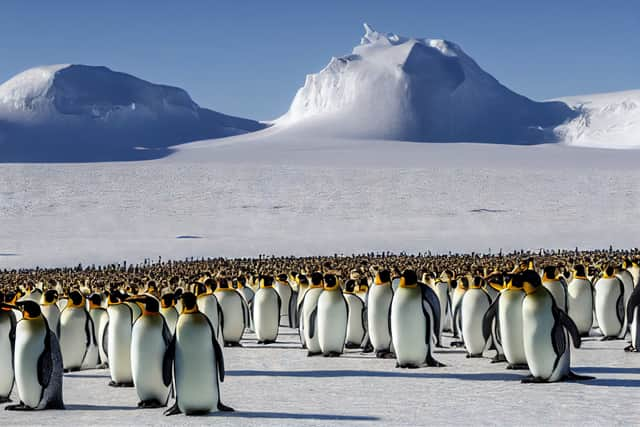Scientists discover emperor penguin colony in Antarctica using satellite images to track penguin poo
and live on Freeview channel 276
An emperor penguin colony has been discovered by scientists in the usually inaccessible regions of Antarctica. The discovery was made in the remote continent after seeing the colony using satellite images.
The colony is made up of around 500 birds and its discovery means the total number of known breeding sites on the continent is now 66. . Half of the colonies here have been discovered via space satellites.
Advertisement
Hide AdAdvertisement
Hide AdDr Peter Fretwell, of the British Antarctic Survey, who led the research said: “This is an exciting discovery. [But] like many of the recently discovered sites, this colony is small and in a region badly affected by recent sea ice loss.”
British Antarctic Survey (BAS) scientists have been looking for new colonies for the last 15 years using satellite imagery to locate brown guano stains (also known as penguin poo) on the ice and go from there.


The discovery has raised further concerns regarding the climate crisis which poses an existential threat to these colonies due to the rapid pace that sea iec is melting. Emperor penguins are the only penguins that breed on sea ice, as opposed to land. They are also only located in inaccessible, and remote areas that experience temperatures as long as -60°C, making them hard to study.
Dr Fretwell further warned about the danger of climate change and the effect it will have on the penguins saying: "If the ice breaks up before that, the chicks fall into the water and drown or freeze.” Penguins need the ice to last between April and September to give the chicks time to grow more robust.
Advertisement
Hide AdAdvertisement
Hide AdThe size of the colony has a direct impact on their survival as the birds huddle together for protection against winter storms, which can be particularly rough during the two month period in which the male penguins incubate the eggs before they hatch.
The latest colony was discovered at Verleger Point, in west Antarctica, based on images from the European Commission’s Copernicus Sentinel-2 satellite mission, and confirmed on high resolution images from the Maxar WorldView-3 satellite.
Comment Guidelines
National World encourages reader discussion on our stories. User feedback, insights and back-and-forth exchanges add a rich layer of context to reporting. Please review our Community Guidelines before commenting.
